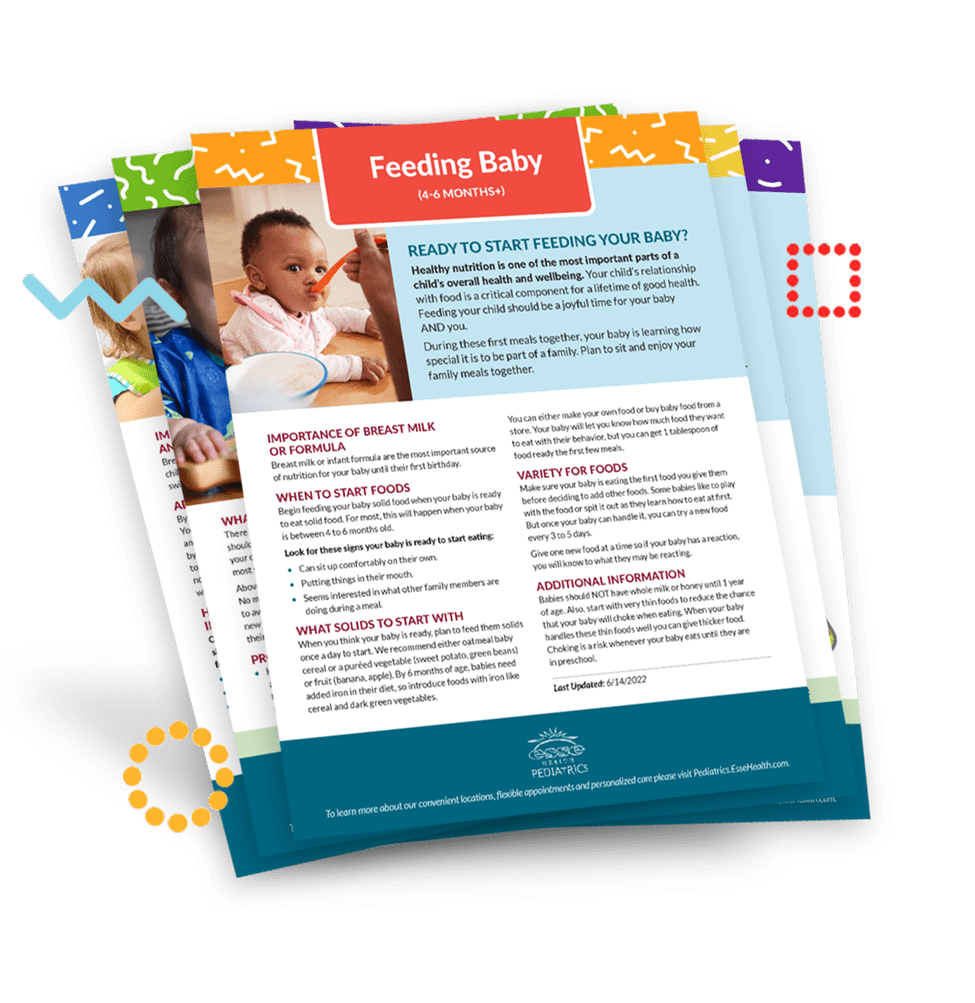Our goal is always to keep your child growing and healthy
One of the most important ways to support your child’s overall health and well-being is with healthy nutrition. From providing help for breastfeeding mothers to navigating picky eaters, your Esse pediatrician is here to help.
Nutrition for Babies
MILK FOR YOUR NEW BABY
Whether you feed breast milk, formula, or a mix of the two, this provides your baby with nearly every nutrient they’ll need for the first year of their life.
Breastfeeding: Breast milk has several advantages over manufactured substitutions, including the right balance of nutrients—and is the gentlest on your baby’s system.
Bottle-feeding: Many parents decide not to breastfeed or may be unable to breastfeed—and there are several healthy formulas available. Infant formulas are composed of a blend of protein, calories, fat, vitamins, and minerals ideal for your child’s growth.
Find more information Breastfeeding and Bottle Feeding in our New Baby Handbook.
STARTING SOLID FOODS
Wondering when to introduce your child to solid foods? Look for these common signs that signal your child is ready for the next step:
- Can sit up comfortably on their own
- Puts things in their mouth frequently
- Seems interested in what family members are doing during a meal
When you see all three signs, your baby is ready to start eating solid foods.
Read more in Feeding Your Baby (PDF)
At this time, you can opt for the traditional spoon-fed route or baby-led weaning. Before making this decision, we recommend discussing your options with your pediatrician and others who may help care for your baby to determine what method makes the most sense for your baby and your family.
Baby-led Weaning: Baby-led weaning helps babies regulate their own nutritional intake and appetite. Instead of spoon-feeding your baby pureed food, this method lets your baby feed themselves—and gives them more control over what (and how much) they eat.
Nutrition for Toddlers
As your baby becomes a toddler their nutrition needs change. The first big change happens around the first birthday with what we call “The Great Transition,” when your baby moves away from a mostly milk-based (breastmilk or baby formula) diet to a mostly- solid food diet.
Read about The Great Transition (PDF)
As your toddler grows and becomes independent, their eating patterns can change again. Your child's appetite may decrease at this age because his/her growth is slowing normally. Because they can make choices during meals, toddlers often become pickier and frequently settle on a small number of favorite foods. Keep these guidelines in mind:
- Parents decide when to eat, where to eat, and what foods are served
- Child decides if they are hungry, how much of the foods are to be eaten [OK for them not to eat if they are not hungry]
Read Healthy Eating for Toddlers to build healthy eating routines (PDF)
During this stage, try to prioritize two key nutrients – calcium and fiber.
Calcium: Calcium is necessary for building strong, healthy bones and teeth. One of the easiest ways to ensure your child gets the calcium they need is through milk. However, if your child is lactose-intolerant, you can try soy milk, tofu, sardines, or calcium-fortified products, such as orange juice, cereal, waffles, and oatmeal.
Fiber: The toddler years are often the start of your child saying “no thanks!” Although your child may want to eat pasta, fries, or chicken nuggets as the basis of their diet, their toddler years are a necessary time to encourage natural sources of fiber. Think fruits and vegetables, whole grains, and beans—all great sources of fiber.
The American Academy of Pediatrics (AAP) has more extensive information about toddler nutrition at their website.
Nutrition for Preschoolers
Children at this stage are increasingly aware of the social context of eating. By watching other children and adults they learn both healthy and less healthy eating habits including: when and where eating takes place, what types of foods are consumed, and how much. Keep these guidelines in mind:
- Parents decide when to eat, where to eat, and what foods are served
- Child decides if they are hungry, how much of the foods are to be eaten [OK for them not to eat if they are not hungry]
Preschoolers depend on adults to offer them healthy foods and age-appropriate portion sizes. Teach your child appropriate portion sizes. The serving size should be the size of the child's palm for meats and the size of their fist for fruits and vegetables.
A healthy guide for parents of preschoolers to follow is the 7-5-2-1-0 Rule:
7 - Eat a healthy breakfast with some protein every day
5 - Or more servings of fruits & vegetables per day (size of the child's palm)
2 - Or fewer hours of “screen time” per day
1 - Hour or more of physical activity per day
0 - Zero sugar sweetened beverages
The American Academy of Pediatrics (AAP) has more extensive information about toddler nutrition at their website.
Nutrition for Picky Eaters
When you begin introducing your child to new foods in their diet, they might not immediately like them—and that’s okay. Here are some tips to help:
Offer a variety of foods from the beginning. As soon as your child begins to eat solid food, start offering a variety of flavors. This can help prevent picky eating down the road.
Keep trying. Just because your child refuses to eat a specific food on the first try doesn’t mean you should never try again. Instead, freeze the leftovers and offer them again in a few days.
Mix it up. Mix new foods with foods you already know your child likes. This can help encourage your toddler to try new foods.
Provide choices. Try giving your toddler a choice between two healthy options—and incorporate at least one healthy food into a meal each day.
Keep it neutral. If your child refuses to eat a particular food, stay calm. Never use food as a reward or as punishment—this pressure can cause more challenges down the road. Instead, trust that if your child is hungry, they will eat.
Learn some additional strategies if your child is a picky eater
Nutrition for Grade-schoolers
Continue to teach your school age child healthy eating habits when you are together so they can make healthy choices when they are apart from you. At this age, more choices are made away from the home including school and fast-food restaurants where choices are tilted towards less healthy food and portion sizes can be too large. Snacking after school is often unsupervised. Many children in this age group do not consume
A healthy guide for parents of preschoolers to follow is the 7-5-2-1-0 Rule:
7 - Eat a healthy breakfast with protein every day
5 - Or more servings of fruits & vegetables per day (size of the child's palm)
2 - Or fewer hours of “screen time” per day (school screen work not included)
1 - Hour or more of physical activity per day
0 - Zero sugar sweetened beverages
The American Academy of Pediatrics (AAP) has more extensive information about childhood nutrition at their website.
Nutrition for Teens
Eat something healthy that includes protein for breakfast each morning.
Teens like to stay up late at night and eat lots of snacks - Make sure to eat some healthy snacks and not too much junk!
Try to eat 5-9 servings of fruits and vegetables each day.
Learn how to read nutrition labels so you can make healthy choices. Ask your parents or doctor to help you.
For your body to grow, you need 1200 - 1600 mg of calcium daily. Eat at least 3 low fat dairy servings per day or take calcium supplements. You also need get 600 IU (international units) of vitamin D every day. Dairy products and fish are good sources of Vitamin D.
Limit fast food and soda intake. Also, many drinks have lots of added sugar and caffeine. Drinking water and milk are the healthiest choices.
The American Academy of Pediatrics (AAP) has more extensive information about teen nutrition at their website.
Have a question about nutrition?
We are here to help. If you have any questions about supporting your child’s nutrition and health, you can call or text your doctor’s office. If you don't have a pediatrician, see our locations to find one near you.

Dowloadable Nutrition Guides
Feeding Your Baby
Learn everything you need to know about feeding your baby, the importance of breast milk or formula, and what solid foods to start with.
Feeding Your Baby – Next Steps:
Once you’ve started your child on solid foods, here’s what you need to know about the next steps.
Baby-Led Weaning
Curious about what baby-led weaning is? Here’s everything you need to know about this method.
The Great Transition
Here’s everything you need to know about feeding your child and nutrition when your baby turns one year old.
Healthy Eating for Toddlers
Wondering the best way to promote healthy eating habits for your child? Here are our recommendations for developing healthy eating foundations for toddlers.
Locations
Pediatric & Adolescent Medicine at Watson Road
9580 Watson Road, Suite A
St. Louis, MO 63126

